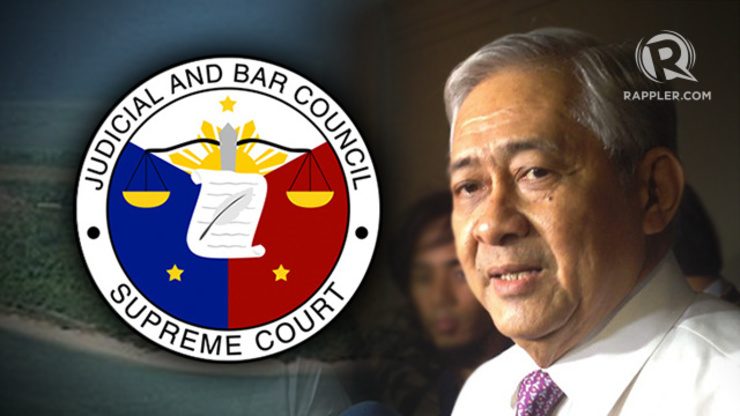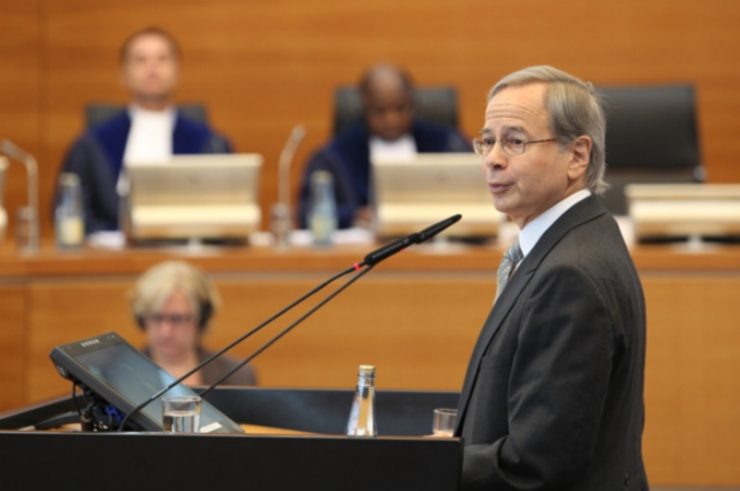SUMMARY
This is AI generated summarization, which may have errors. For context, always refer to the full article.

MANILA, Philippines – Back in the running for a seat in the Supreme Court, Solicitor General Francis Jardeleza was accused of disloyalty and possibly committing a culpable violation of the Constitution.
Sources in the Judicial and Bar Council (JBC) who are knowledgeable about what transpired during deliberations told Rappler he deleted a “portion” in the memorandum submitted by the Philippines to a United Nations-backed tribunal. The memorandum seeks to challenge China’s maritime claims in the West Philippine Sea. (It is the JBC that vets nominees to the High Court and other lower courts.)
The deleted portion, totaling 14 paragraphs, was reinserted at the last minute, but only after Justice Secretary Leila de Lima intervened and informed President Benigno Aquino III about it. The Philippine government finally filed the pleading on March 30, 2014.
Its deletion would have resulted in a “colossal mistake” undermining the country’s legal claim and territorial integrity, Rappler sources privy to the case said.
Sources told us that Jardeleza removed the portion involving the Taiwan-controlled Itu Aba, the largest island in the contested Spratly Group of Islands, in the memorandum (called a memorial in international law) that was supposed to have been submitted to the arbitral tribunal at the Permanent Court of Arbitration in The Hague in the Netherlands.
In excluding Itu Aba, Jardeleza reportedly argued this would have appeased China and helped restore normal ties. But in trying to appease China and bring about more harmonious relations, Jardeleza might have committed a breach of public trust for effectively undermining Philippine claims to the disputed Spratly islands.
Supreme Court issue
The Itu Aba controversy would have died a natural death, except that Jardeleza unwittingly revived it.
In May 2014, Jardeleza, for the third time, applied for the SC seat vacated by retired Justice Roberto Abad. During the JBC interview, Jardeleza said he hoped “to bring to the Court a certain level of credibility as regards decision-making.” (READ: For the 3rd time, SolGen Jardeleza tries to join SC)
But Chief Justice Maria Lourdes Sereno was not convinced about Jardeleza’s faithfulness to the Constitution.
A JBC source said it was Sereno who invoked Rule 10, Section 2 of the JBC rules which effectively blocked Jardeleza’s bid in the SC. The rule states that “the affirmative vote of all the members of the Council must be obtained for the favorable consideration” of a nominee in case the integrity of the applicant is challenged (emphasis ours).
The same source said Senior Associate Justice Antonio Carpio appeared before the JBC to testify on Jardeleza’s questionable position in the arbitration case against China. The alliance between him and Sereno was unexpected, given Carpio’s having lost the chief justice post to her – despite him being the most senior of the high court justices.
By invoking Rule 10, Sereno, who is also ex-officio chair of the JBC, raised “a question of integrity” on the part of Jardeleza.
When asked by the JBC to respond to the accusations of Sereno and Carpio, Jardeleza refused and instead brought the case to the SC. (READ: Solgen asks SC to stop Aquino from picking next justice)
The JBC thus excluded him from the short list of SC nominees submitted to President Benigno Aquino III.
On Tuesday, however, the SC en banc sided with Jardeleza and put him back on the nominees’ list. The President has until Wednesday, August 20, to choose a new SC justice.
Rappler repeatedly tried to get the side of Jardeleza, texting and calling his phone but got no reply. We also called his office and relayed the reason for the call and left a number for him to call. The return call never came.
We followed up our request for his side after the SC granted his plea to be included in the shortlist submitted by the JBC to the President. (READ: SC: Include Jardeleza as High Court nominee)
Appeal to Aquino
How Jardeleza’s potentially “colossal mistake” was corrected also exposed the politics inside Malacañang.
One of the sources said American lawyer Paul Reichler, lead counsel of the Philippines in the arbitration case filed against China in the West Philippine Sea maritime dispute, was alerted and alarmed over the removal of Itu Aba.

Sometime before March, he sought to inform Aquino about the lapse and warn him about its implication.
For more than 3 hours, the American lawyer, together with two other lawyers, waited in Malacañang for an audience with the President. But a Malacañang official who has the ear of the President, reportedly made sure Reichler would be denied that meeting.
In the meantime, De Lima got wind of the Itu Aba case. Realizing that its removal in the memorandum would be a costly mistake, she called for a meeting with Foreign Affairs Secretary Albert del Rosario and Jardeleza.
When asked about Itu Aba’s exclusion from the memorandum, Jardeleza reportedly said its inclusion would have “offended China” and that “there is no need to include it (Itu Aba).”
Jardeleza said the inclusion of Itu Aba in the memorandum would delay proceedings. The Solicitor-General also cited a German expert Stefan Talmon who, according to insiders, turned out to be under the retainer of China, having written a book, The South China Sea Arbitration: A Chinese Perspective. He has been sympathetic to the Chinese position on the West Philippine Sea.
It was suspicious for him to cite the German expert when the Philippine government had already hired the services of the Washington-based Reichler, sources in the judiciary said.
In the end, De Lima prevailed upon the President to put it back. Insiders said they interpreted Reichler’s statements as an insinuation that he would resign as lawyer for the Philippines. (In response to Rappler’s questions, Reichler denied this.)
The sources said Jardeleza could have been acting on the behest of a Palace official, who in turn, is reporting to a higher principal. “Jardeleza could not say no to this Malacañang official,” one of the sources said, mindful of what happened to his predecessor, Jose Anselmo Cadiz, who resigned in February 2012.
The source, who is closely following the territorial issue with China, said the forthcoming national elections in 2016, could be one of the factors why China is being favored. “The Chinese can read the minds of our politicians.”
On January 22, 2013, the Philippines formally filed a case before the UNCLOS arbitral tribunal, and on March 30 this year, the government submitted its memorandum contesting China’s controversial 9-dash line maritime claim that covers almost the entire West Philippine Sea (also known as South China Sea). (READ: China’s claim ‘invalid’, contrary to UNCLOS’– del Rosario)
“With firm conviction, the ultimate purpose of the memorial is our national interest. It is about defending what is legitimately ours. It is about securing our children’s future. It is about guaranteeing freedom of navigation for all nations. It is about helping to preserve regional peace, security, and stability,” Del Rosario said in a media briefing following the filing of the memorandum.
China has refused to participate in the arbitration case, saying it is a territorial dispute and not a maritime dispute which the Philippines has argued before UNCLOS. (READ: China rejects PH case, invokes int’l law)
Carpio however has said that what the Philippines is raising is essentially a maritime dispute which is governed by UNCLOS. (READ: What’s at stake in our case vs China)
Using back channels, China sought to delay the filing of the Philippine memorandum, informing counterparts it will reciprocate by withdrawing its ships in Bajo de Masinloc or Panatag Shoal, reports said.
China has also been reported as saying it would not establish a South China Sea Air Defense Identification Zone (ADIZ), similar to the ADIZ it claimed in the East China Sea that covers the air space of Japanese-controlled Senkaku islands. Japan has protested China’s move.
SC deliberations
During Tuesday’s deliberations in the Supreme Court, the key argument raised by those who voted to retain Jardeleza’s name on the JBC shortlist was “due process.” Led by Justices Arturo Brion and Teresita Leonardo-De Castro, they argued that integrity should not be discussed because Jardeleza had previously gathered 4 out of 6 votes in the JBC anyway.
Two other justices – Sereno and Carpio – inhibited themselves from the deliberations on Tuesday, leaving Justice Marvic Leonen to argue against the inclusion of Jardeleza. Leonen, according to sources, cited “judicial overreach.”
The SC should presume that the JBC, an independent constitutional body, knows what it is doing. To supplant its discretion by insisting on the inclusion of Jardeleza would have been tantamount to judicial overreach. The argument however failed to convince the majority.
Little time left
Pressed for time, the SC deliberated on Jardeleza’s petition on Tuesday. On Wednesday, August 20, the 90-day-period within which the President must make a new appointment to the SC, lapses. Jardeleza is known to be a favored candidate of Aquino.
This may be Jardeleza’s last attempt at the SC. The seat vacated by Abad is theoretically Aquino’s last chance to appoint his own choice to the high court.
The only other justice scheduled for retirement during Aquino’s term is Justice Martin Villarama, who bows out on April 14, 2016, just a month before the May 2016 presidential elections.
While the SC has ruled that the ban on appointments during the election period does not cover the judiciary, Aquino criticized Arroyo’s appointment of Renato Corona as Chief Justice. Corona was appointed within that period covered by the appointment ban.
Jardeleza is turning 65 on September 26. If appointed, he gets to stay in the SC for 5 years, until 2019, or 3 years beyond the Aquino administration. Judges and justices mandatorily retire when they reach 70.
If Jardeleza is appointed by Aquino to the high court, however, his choice would have far-reaching effects on the Judiciary, which has already been stricken by factionalism as a result of the appointment of Sereno.
At the very least, the leadership of Aquino’s own hand-picked chief justice would be foreseeably undermined. – Rappler.com
Add a comment
How does this make you feel?
There are no comments yet. Add your comment to start the conversation.